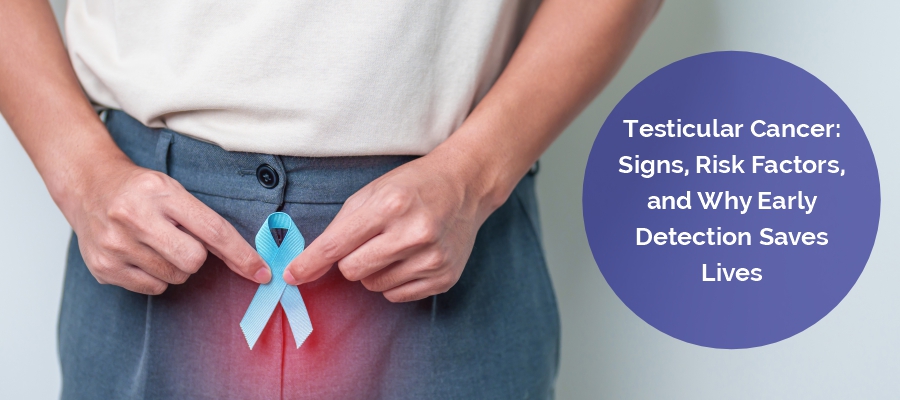
Testicular Cancer: Signs, Risk Factors, and Why Early Detection Saves Lives
Testicular cancer is a rare but highly treatable cancer that affects the testicles, the male reproductive organs responsible for producing sperm and testosterone. While it can occur at any age, it is most common in young men between the ages of 15 and 35. Understanding its signs, risk factors, and the importance of early detection can significantly improve survival rates and treatment outcomes.
What is Testicular Cancer?
When cells in the testicles multiply without normal regulation, they can create a tumor, which is known as testicular cancer. It is one of the most curable types of cancer, especially when detected early. There are two primary types of testicular cancer:
- 1. Seminomas – A slow-growing cancer that typically remains confined to the testicle but may spread to lymph nodes.
- 2. Non-seminomas – A more aggressive form that grows and spreads quickly to other parts of the body.
Signs and Symptoms of Testicular Cancer
Recognizing the symptoms of testicular cancer early can lead to prompt medical intervention and better treatment outcomes. Common symptoms include:
- 1. A painless lump or swelling in one testicle
- 2. A feeling of heaviness or discomfort in the scrotum
- 3. Pain or discomfort in the testicle or scrotum
- 4. Enlargement or tenderness in the breast tissue (gynecomastia)
- 5. Dull ache in the lower abdomen or groin
- 6. Sudden collection of fluid in the scrotum
If any of these symptoms persist for more than two weeks, consulting a Testicular Cancer Specialist is crucial for early diagnosis and treatment.
Risk Factors for Testicular Cancer
While the exact cause of testicular cancer remains unknown, several risk factors increase the likelihood of developing the disease:
- 1. Undescended Testicle (Cryptorchidism): Men born with one or both testicles failing to descend into the scrotum are at higher risk.
- 2. Family History: Having a close relative with testicular cancer increases the risk.
- 3. Previous Testicular Cancer:If one testicle has been affected, there is a higher chance of developing cancer in the other.
- 4. HIV Infection: Studies suggest a link between HIV and a slightly increased risk of testicular cancer.
- 5. Race and Ethnicity:White men are at higher risk than men of other racial backgrounds.
Why Early Detection Saves Lives?
Testicular cancer has an excellent prognosis when diagnosed early. The survival rate for localized testicular cancer is nearly 99%, emphasizing the importance of self-examinations and routine check-up.
How to Perform a Testicular Self-Examination?
A self-exam can help detect testicular cancer early. Follow these simple steps:
- 1. Perform the exam after a warm shower when the scrotal skin is relaxed.
- 2. Gently roll each testicle between the thumb and fingers, feeling for lumps or unusual changes.
- 3. Look for swelling, firmness, or changes in size and shape.
- 4. If notice anything unusual, schedule an appointment with a Testicular Cancer Specialist immediately.
Treatment Options for Testicular Cancer
Treatment for testicular cancer depends on its type and stage. Common treatment methods include:
- 1. Surgery: Removal of the affected testicle (radical orchiectomy) is the primary treatment.
- 2. Radiation Therapy: Often used for seminomas to target and destroy cancer cells.
- 3. Chemotherapy: Used in cases where cancer has spread beyond the testicles.
Advancements in Robotic Surgery Doctor In Ahmedabad have led to high survival rates, even for advanced cases.
Get in touch with us today to book consultation and take the first step towards improving prostate health!
The Gujarat Uro Oncology Associates are ready to manage patients every step of the way, offering expertise, empathy, and unwavering support. To learn more about their services and embark on cancer journey with confidence, reach out at +91 75730 04253 or email bakshihemang@yahoo.co.in. Path to healing begins here.
A painless lump or swelling in the testicle is usually the first noticeable sign.
Yes, testicular cancer is one of the most curable cancers, especially when detected early.
Testicular cancer is most common in men aged 15 to 35 but can occur at any age.
Men should perform a self-exam once a month to check for lumps or abnormalities.
Treatment may impact fertility, but sperm banking before treatment is an option for those planning to have children.
